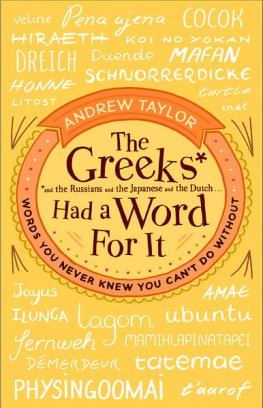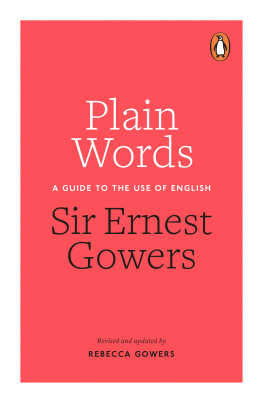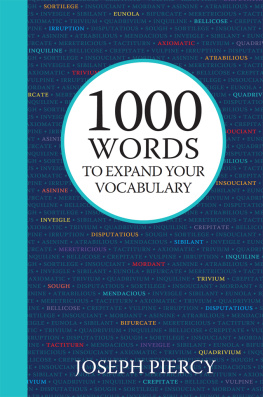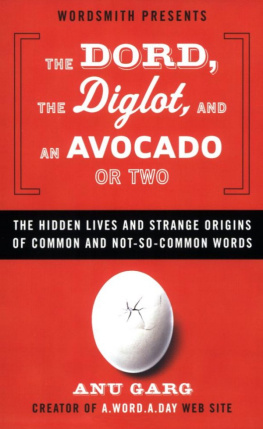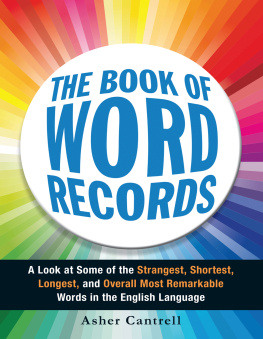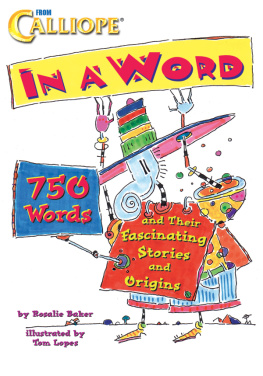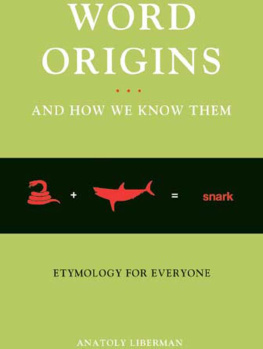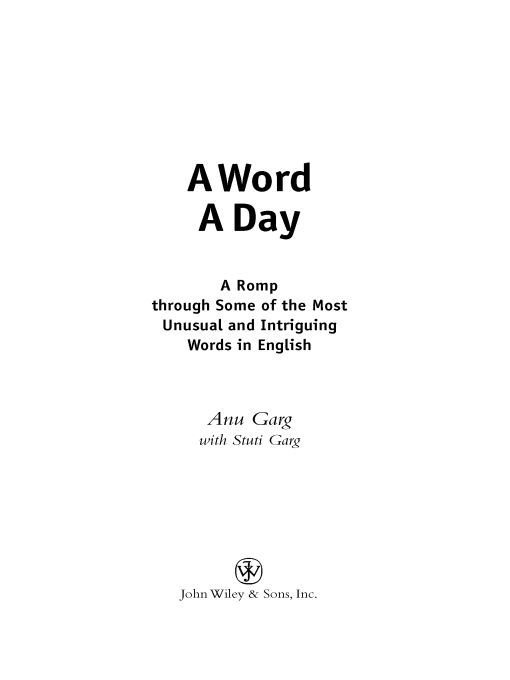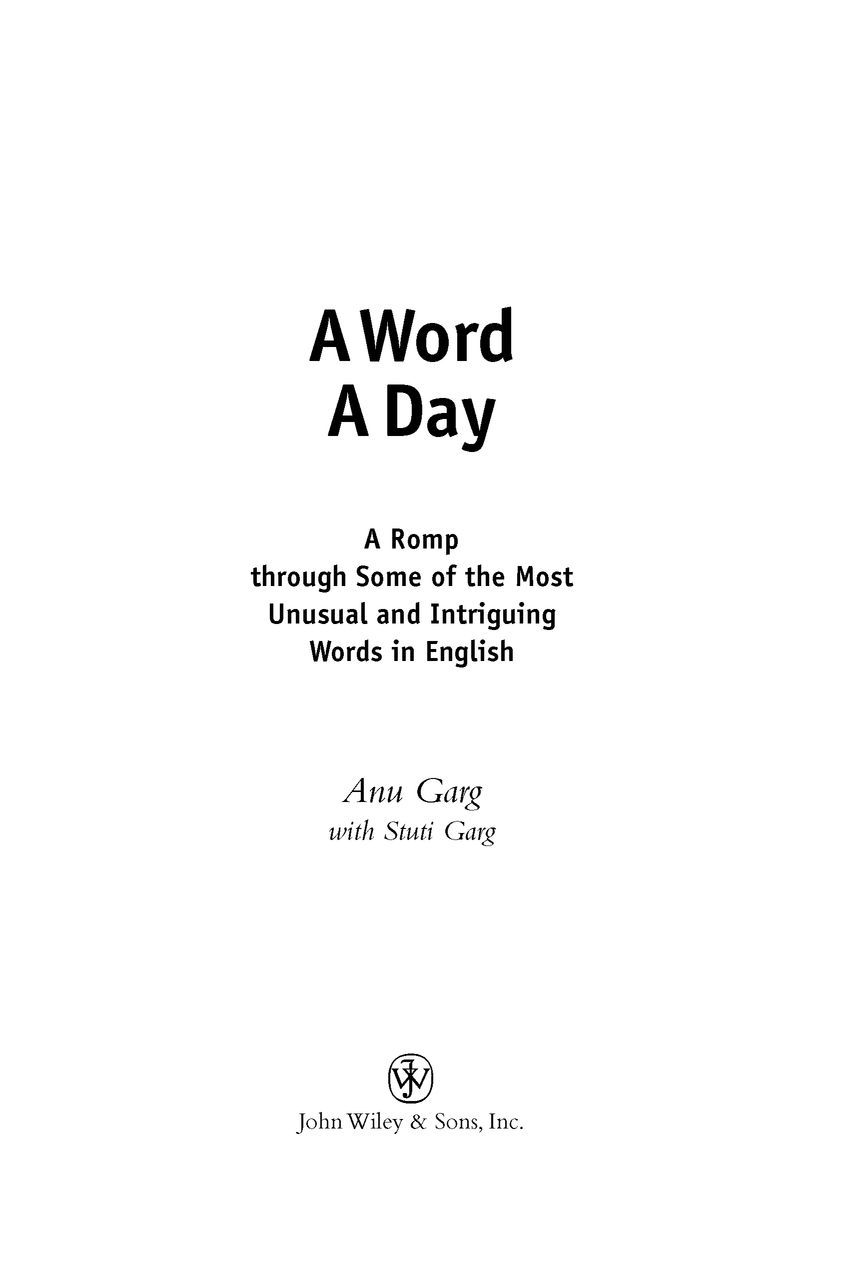Table of Contents
Every word was once a poem.
RALPH WALDO EMERSON
What are you doing, Daddy?
Im writing a book, Ananya.
What kind of book?
Its a book of words.
OK, can you write cat?
Well, its supposed to be a book of big and hard words.
OK, how about peacock?
Thats fine.
And how about heart and snowflake and teddy bear and dark green and purple and telephone and sun ... I want to write a book too!
Sometimes simpler words are more profound.
Acknowledgments
A number of people contributed to make this book possible. A big thank-you to all the linguaphiles on A.Word.A.Day (AWAD) for being a part of the AWAD community. Weve learned much from you. Thanks to Carolanne Reynolds for reviewing drafts of the book and for her comments. Thank you to Todd Derr and Eric Shackle for their dedication to AWAD.
Thank you to Chip Rossetti, our editor, for believing in this book and for steering it to completion.
Special thanks to Bill Holland for his support.
A humble thank-you to our parents for their blessings.
A bow to our guru.
Introduction
This is a book of words. But then, all books are books of words. This book is an expression of the joy of words, the magic of words, the music of words. Its a book of words arranged in many thematic bouquets, each bouquet collecting words of a kind. Words that make us laugh, words that make us feel incredulous, words that pack a whole story in just a few letters, words that delight us, and words of many other shapes, sizes, and hues.
Perhaps its no coincidence that the word words is an anagram of sword. Well-used words cut through ambiguity and confusion like a sharp sword in the hands of an expert swordsman. Like a fencer with a whole supply of moves, feints, and parries, a person with a large and varied vocabulary at her command can find just the right word for the occasion. Whether we realize it or not, words touch something deep within all of us, for what would we be without words? Words move us, inspire, animate, motivate, challenge, and delight us. Its what this whole book is about.
Take the word delight, for instance. Are we put into dark when we are de-lighted? Not exactly. The word delite might sound like a corruption of the word brought forth by some marketer, but thats the source of the word. The word delight came to us from earlier delite, which ultimately is from the same source as the word delectable.
Would you believe that lettuce is a cousin of milk; that corduroy literally means the cloth of the king (and hence the king of cloth?); that salary comes to us from salt; that trivia takes its origins from cross-roads; that when you flex your muscles, you are moving mice, etymologically speaking; that cockamamie draws inspiration from fake tattoos; that carnival rose from the idea of taking meat away during Lent; that cynic has its origins in canines. Countless other words have similarly surprising derivations.Thats the marvel of words, leading us to unexpected corners waiting to be discovered.
Then there is arrangement of letters. Not one or two, but dozens of words have all five vowels in them. And there are many with all five vowels in order, such as facetious and abstemious, to name two examples. There are words within words; for instance, tiger is inside dentigerous (one having teeth). And there are semordnilaps, or words that are formed by reversing other words, such as drab and bard.
Going down from words to letters, did you know that all continents begin and end with the same letter? And that all, except Europe, begin and end with the letter A? Isnt it interesting to know that Q is the only letter in the alphabet that does not appear in the name of any state of the United States?
How do you remember the difference between the two kinds of camels, dromedaries and bactrians? Easy! Notice the beginning letters: one bump in a D, two bumps in a B. When you visit a cave and marvel at natures enchanting formations, which are stalagmites and which ones stalactites? Stalagmites are formed on the ground while stalactites hang from the ceiling.
Open the dictionary and feast on the words. The bigger the betteran unabridged is the bestand discover that world where each word is a world in itself. Mark Twain, that master of words, once jocularly observed about a dictionary, I have studied it often, but I never could discover the plot. Well, a dictionary is a place where each word has a plot, a whole history behind it. Each word has its own biographywe call it etymology. They change, they evolve, they adapt, they die, and they get revived.
Even though this book presents made-up examples, all of these words can be found in the pages of popular newspapers, magazines, books, and web sitesthough not that often. Thats to say that these are real words, not obscure words picked from a word museum. I hope you enjoy them.Youre invited to join my daily romp through the world of words. You can subscribe to A.Word.A.Day (AWAD) at http://wordsmith.org. I look forward to your comments and suggestions about the experiences of words at anu@wordsmith.org.
Welcome to the world of words!
CHAPTER 1
Animal Words
Its a blessing to have a child at home. As a parent, I strive to answer my daughter Ananyas incessant questions about the moon and earthworms and clouds and trees and bears as truthfully as I can. Our investigations into these seemingly mundane matters often reveal insights that are learning experiences for both of us. But there are times when my thoughts are elsewhere and I simply answer the question Why? with, Because thats how God made them. I didnt know the joke was on me until the evening I found the corner of our living room wall scribbled with bright shades of crayons. When questioned why we had that mural on the wall, she simply replied, Because thats how God made it.
Well, if we were to ask why a crab moves crabwise or sideways, thatd be a pretty good answer: Because thats how God (or nature, depending on how your beliefs run) made crabs. Because thats how their legs bend. Thats how their muscles flex. Thats how theyve adapted. Thats how they survive as a species. And thats how we got a synonym for the word sideways in our dictionary. If we were to look up the term humanwise in a crabs dictionary, chances are it would mean sideways.
Here are a few words derived from animals (the only animal-based products we use around here).
crabwise (KRAB-wyz)
adjective 1. Sideways. 2. In a cautious or roundabout manner.
From the sideways movement of crabs.Also see cancrine (chapter 31).
And then in a true action-film manner, the hero began moving crabwise along the wall while scanning the alley for the villain.
testudinate (te-STOOD-in-ayt), also testudinal or testudinarian
adjective 1. Slow-moving, like a turtle. 2. Curved like the carapace (shell) of a turtle; vaulted.


